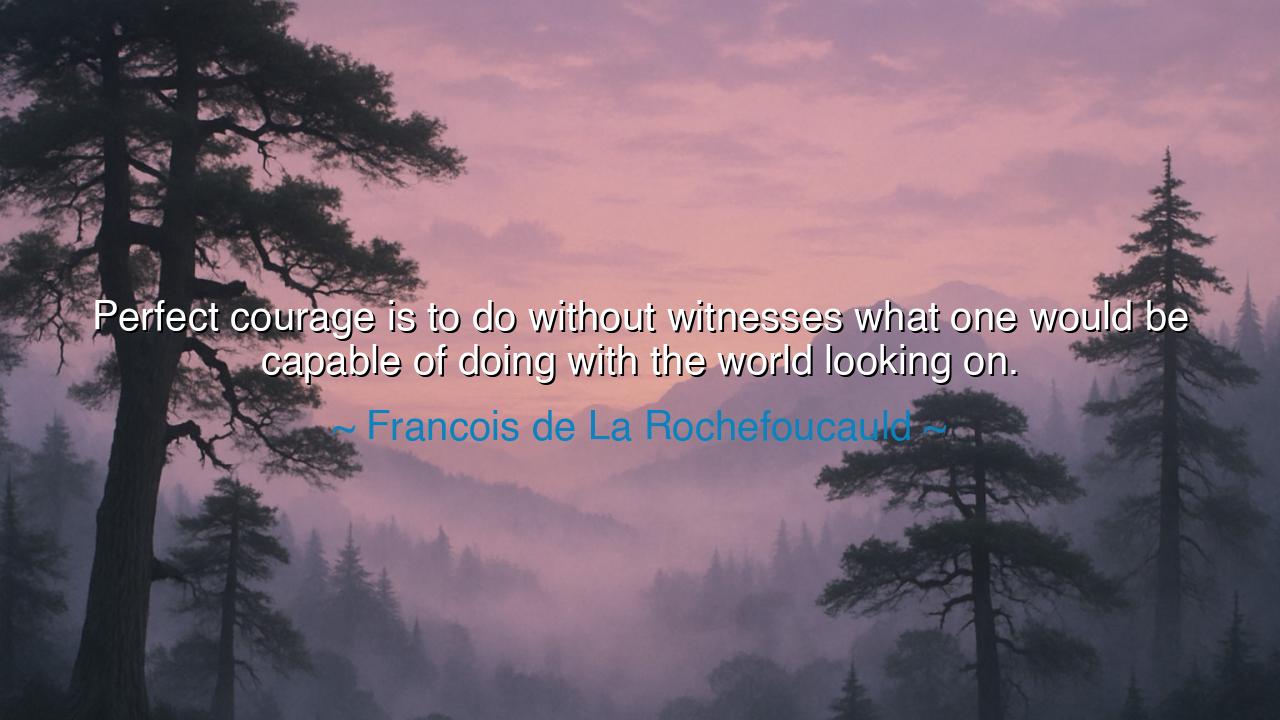
Perfect courage is to do without witnesses what one would be
Perfect courage is to do without witnesses what one would be capable of doing with the world looking on.






The words of François de La Rochefoucauld — “Perfect courage is to do without witnesses what one would be capable of doing with the world looking on.” — strike like the toll of a great bell, deep and resonant, echoing through the corridors of conscience. In this single line, the French moralist lays bare one of the most profound truths about courage and character: that true bravery is not a performance, but an inward strength — an act of integrity born in silence, unseen and uncelebrated. To act nobly when all the world watches is admirable; but to act nobly when no one will ever know — that is perfect courage.
La Rochefoucauld lived in 17th-century France, a world of elegance and artifice, where reputation was often valued above virtue. He observed the nobility and courtiers of his age — men and women clothed in honor yet hollowed by vanity — and saw that much of what passed for courage, honor, or virtue was but a shadow cast for the eyes of others. From his keen observations was born his collection of Maxims, where he distilled human behavior into brief but piercing truths. This quote reflects his belief that the highest form of courage — indeed, of morality itself — is that which requires no audience, no applause, no witness.
To possess perfect courage, then, is to act with integrity in solitude — to choose what is right, even when no one will praise or remember it. For the courage that depends upon recognition is not courage at all; it is vanity draped in noble clothing. The hero who fights bravely before the crowd may be cheered, but the one who stands firm when the world turns away, when the shadows are long and the heart trembles — he alone knows the full weight of valor. True courage is not fed by the gaze of others, but by the quiet voice of the soul that whispers, “This is right.”
History gives us luminous examples of this hidden bravery. Consider Rosa Parks, who, in 1955, refused to surrender her seat on a Montgomery bus. Hers was not the courage of spectacle, for she did not seek fame or history’s gaze; she sought only to preserve her dignity, quietly, steadfastly. In that moment, there were no banners, no crowds — only the stillness of conscience against the machinery of oppression. Yet from that solitary act of defiance bloomed a movement that changed the world. Parks’ courage was perfect, for it was born not of pride but of principle, not of witnesses but of truth.
La Rochefoucauld’s insight also teaches that true courage resides in the moral and spiritual realm as much as the physical. To speak truth when silence would be safer, to resist corruption when submission would bring reward, to remain kind in a world that mocks compassion — these are acts of courage unseen by the multitude, yet radiant in the eyes of eternity. The ancient Stoics called this the virtue of the inner citadel — the fortress of the self, where one’s principles are kept unbroken regardless of public acclaim or condemnation. It is easy to act well when one’s deeds are applauded; it is divine to act well when one’s deeds are forgotten.
There is a lesson here that humbles and ennobles. Ask yourself: do you act from conviction or from spectacle? When you speak truth, do you do it because it is right — or because others are listening? When you show kindness, is it for the soul’s sake, or for admiration? Perfect courage requires that we strip away the masks of performance and live authentically, guided not by the crowd’s praise but by the quiet law of conscience. For only the self that acts rightly in solitude can act purely in the public square.
Thus, let this teaching be carved upon your heart: the measure of courage is not found in the battlefield or the stage, but in the silent choices of everyday life. Stand firm when none see you. Be honest when deceit would be easy. Keep your integrity when compromise would profit you. In the stillness of such moments, when only the soul is witness, you will meet your truest self — and know what it means to be courageous.
And so, as La Rochefoucauld teaches, let your courage be without need of spectators. Do not live for the eyes of others, but for the light within you. For the man or woman who can act with strength, compassion, and truth in the absence of applause — who can face fear and temptation with no witness but their own heart — possesses a perfect courage, one that needs neither fame nor reward. Such courage, quiet yet unyielding, is the highest form of greatness — the kind that builds not monuments of stone, but legacies of the spirit.






AAdministratorAdministrator
Welcome, honored guests. Please leave a comment, we will respond soon